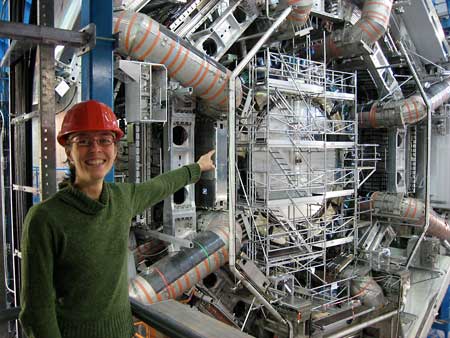
McGill researchers part of international team that confirmed the boson’s existence
By Chris Chipello
The Nobel Prize in Physics 2013 was awarded today to Peter W. Higgs of Britain and François Englert of Belgium “for the theoretical discovery of a mechanism that contributes to our understanding of the origin of mass of subatomic particles, and which recently was confirmed through the discovery of the predicted fundamental particle, by the ATLAS and CMS experiments at CERN’s Large Hadron Collider.”
The ATLAS and CMS experiments each involved collaboration by over 3,000 people from around the world – including McGill University physics professors François Corriveau, Steven Robertson, Brigitte Vachon and Andreas Warburton.
“It’s a great day for particle physics!” said Warburton. “I’m happy that CERN and the ATLAS and CMS collaborations have received mention (in the Nobel Prize announcement) for the colossal work done to find this elusive particle.”
All four McGill physicists are members of the international ATLAS team, which announced its landmark findings in July 2012. And their work on the project continues, underscoring McGill’s significant contribution to the collaborative research that will build on the discovery of the Higgs boson in the years ahead.
CERN’s Large Hadron Collider (LHC) will undergo a series of upgrades over the next several years in order to increase both the energy of the particle collisions and the intensity of the beams of particles accelerated in the 27-kilometre tunnel that runs beneath the Swiss-French border.
“In order to ensure that we can study properties of the Higgs boson and search for new phenomena which may exist in nature under the upcoming experimental conditions of the LHC, we need to improve the ATLAS detector,” Vachon explains. “Significant work to upgrade the ATLAS detector is ongoing in Canada, and specifically at McGill.”
Canada will build one-third of all the detector components that will be installed in ATLAS in 2018 to make it possible to precisely measure the trajectory of muons – a particle that played a pivotal role in the search for the Higgs boson. All Canadian-made detector components will come to McGill to be tested and to have their performance assessed in detail. And only those components that meet strict requirements will be shipped to CERN by boat from the port of Montreal for installation in the ATLAS detector.
“This is an exciting and important project we are leading, which entails the design and construction of a new testing facility for large detector components at McGill,” Vachon says.
For more background on the McGill team’s contributions to the ATLAS collaboration, click here.
